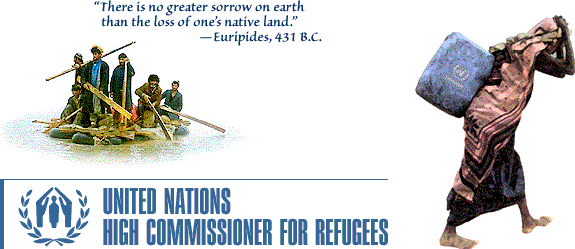| KOSOVO: RETURNEES KILL, EXPEL
SERBS 19 Jul. 99 – Kosovo
Albanians are waging a systematic campaign to kill, kidnap and expel Serbs from Kosovo as
they wreak revenge for past atrocities, UNHCR said Friday, reports BBC News.
Spokesman Kris Janowski said protection of the Serb minority was now the "most
critical issue." The most serious reprisals have been in Pristina, Prizren and
Orahovac, and surrounding villages – which had seen some of the worst Serb violence.
"In Prizren, nearly 50 Serb houses were set alight in less than a week in what
appears to be a systematic campaign against Serbs," Janowski said. Aid workers have
been shocked by the scale of the reprisals. K-For is having to guard Serbs around the
clock, but is increasingly unable to protect them and others. In one incident, two Serbs
were abducted from a UNHCR-run centre in Pristina by five men dressed in black. The
remaining Serbs were so frightened UNHCR had to evacuate them. The Guardian and the
Sunday Telegraph also report. The Guardian today reports pleas to ethnic
Albanians to end their acts of retribution seemed to have fallen on deaf ears around
Gorazdevac, where UNHCR said 180 Serbs returned to Kosovo from Montenegro on Friday.
[Kosovo reprisals horrify UN – http://news.bbc.co.uk/;
Violence And Reprisals + After the war Homecomers find ethnic Albanians are in no mood to
forgo retribution – http://www.newsunlimited.co.uk/;
KLA troops punish collaboration with gang-rape – http://www.telegraph.co.uk/] KOSOVO: GYPSIES FACE MORE PROBLEMS 19 Jul. 99 – The
problems are just beginning for thousands of Roma, or Gypsies, have taken temporary refuge
in a squalid, makeshift camp in Kosovo Polje after being driven from their homes by
returning ethnic Albanians, reports the Los Angeles Times. Many Roma houses have
been looted and burned and some Roma have been assaulted, NATO forces confirm. The Roma
are being driven away from their land in a manner similar to the way Kosovo's ethnic
Albanians were forced out during the spring by Serbs. Unlike the ethnic Albanian refugees
who found sanctuary in other nations during the war, the Roma have few options. They face
worldwide discrimination that hinders their ability to find legal refuge in third
countries. They are appealing to the United Nations to send them abroad, but that is
"not realistic," said Sergio Vieira de Mello, the UN's interim civil
administrator for Kosovo, who this week visited the UNHCR-run camp at Kosovo Polje.
Instead, the UN and NATO-led peacekeepers want to ensure that the Roma can return to their
homes in Kosovo "in security and dignity," de Mello said. But returning home is
difficult because widespread hatred makes it impossible for Roma to live safely, say
administrators of the camp. [Roma Minority Group Becomes Latest Victims in Kosovo – http://www.latimes.com/]
KOSOVANS: EVACUEES RETURNING 19 Jul. 99 – More
than 1,000 of some 15,000 refugees from Kosovo taken in by Germany have
returned home, with more volunteering to return next week, the Interior Ministry said
yesterday, reports AP. A flight is scheduled to leave Munster with 110 refugees
today, and another with the same number tomorrow, the ministry said. It said the refugees
would be flown to Skopje, Macedonia, then taken into Kosovo on buses under arrangement
made by the Bonn-based office of the International Organisation for Migration. Germany,
which took in 15,000 Kosovo refugees, has said all returns will be voluntary this year.
The government is providing free flights and US$240 each to help returns. AP also
reports the first of 6,000 Kosovo Albanians granted sanctuary in Norway, 144 people, took
off for home and an uncertain future in Kosovo on Friday. [More than 1,000 Kosovo refugees
returned home from Germany, more on the way + First of 6,000 ethnic Albanians in Norway
head home to Kosovo – http://www.ap.org/]
CROATIA: SERBS WELCOMED BACK NOW 19 Jul. 99 –
According to its own 1991 census, 12% of Croatia's 4.8m people were Serbs.
After five years of war, the figure had shrunk to less than 4%. Until recently, the
Croatian government wanted to keep it that way, reports The Economist. Officials
openly espoused President Franjo Tudjman's notion that, in ethnic terms, "once
cleansed" should mean "always cleansed." There would, said the president in
1995, be no "mass return" of Serbs who had been driven out of Croatia that year.
Then last year, after considerable arm-twisting from America and the European Union, which
pointed out that most of the 300,000 or so Serb refugees were still Croatian citizens,
Tudjman's government decided they could come home after all. Some 57,000 are back. UNHCR
hopes another 35,000 will follow this year. The main disincentive is the miserable life
awaiting Serbs who do return home. Aid is minimal. Serb refugees are hoping that there
will be an injection of aid (largely from the EU) for the Balkans as a whole. Even so, few
are likely to go back to Krajina. Some of the Serbs now fleeing Kosovo may well end up
back in Croatia-in the villages they fled in 1995. [Good riddance, Serbs, welcome home
– http://www.economist.com/]
This document is intended for public information purposes only. It is not an official UN
document. |


 Document compiled by Dr S D Stein
Document compiled by Dr S D Stein